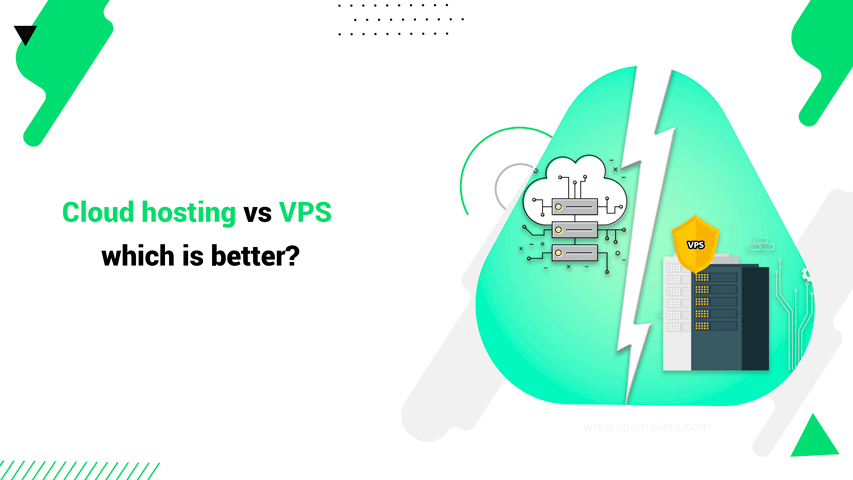Cloud hosting vs VPS hosting: Which is Better?
The growing internet technology has led to the blooming of VPS and Cloud Hosting in recent decades. In this article, I’ll explain the concept behind VPS and Cloud Hosting, how each works, and which best suits your business.
What are the Key Differences between Cloud Hosting and VPS Hosting?
Cloud hosting and VPS virtual hosting can be compared in several ways:

- Security Essential security elements include data backup, regular updates, malware detection and removal, SSL certificates, and network monitoring. Security is a top rank priority for all businesses. This is one of the most important reasons why VPS and cloud hosting take the lead in shared hosting.
- Performance it is called the speed of loading and displaying the pages of a site in the web browser.
- Customization To give users the power to create their own personalized experience is the goal of customization. A experience that fits their individual needs, preferences, and standards.
- Scalability Scalability means you can easily add extra storage, bandwidth, and a small army of CPUs to afford the needs of your enthusiastic new customers when your website’s sale is soaring and new customers are appearing.
- Price and Payments Cloud Hosting and VPS service providers are constantly offering discounts and promotions, which can help customers get cheap deals for their businesses.
- Reliability The essential criteria when estimating the reliability of a hosting service are upload time and upload speed. Clients want their websites to be online 24/7, but you also want them to perform consistently.
- Flexibility It enables business owners, website managers, and personal users have customizable and scalable hosting solutions. So, with high flexibility users can adjust their hosting resources as needed.
In the table below, we compared cloud hosting and virtual VPS hosting so that you have a better understanding of your choice.
| Feature | Cloud Hosting | VPS | Result |
|---|---|---|---|
| Scalability | High scalability with the ability to scale resources up and down on-demand | Limited scalability, with the option to upgrade to a larger server or add more resources | The cloud hosting wins the scalability game. |
| Performance | Generally good performance with the ability to distribute resources across multiple servers | Performance is dependent on the hardware of a single server but can be improved by adding more resources | The cloud hosting wins the performance game. |
| Flexibility | High flexibility, with the ability to easily scale resources up and down and access a wide range of services and tools | Limited flexibility compared to cloud hosting, but still offers more control over server resources compared to shared hosting | Both are flexible in different aspects. So a win-win situation here. |
| Security | Generally secure with multiple layers of security, firewalls, and data encryption | Generally secure with multiple layers of security, firewalls, and data encryption | Both are secure in different aspects. So it’s a win-win situation here. |
| Pricing | Can be more expensive compared to VPS hosting due to the on-demand usage billing model | Generally more affordable, with a fixed monthly fee for dedicated server resources | Both have almost similar pricing. However, some service providers offer VPS for slightly lesser costs, so VPS is the winner here. |
| Reliability | High reliability with multiple servers, backups, and automatic failover systems | Varies depending on the provider, but generally, good reliability and uptime with the option to add redundancy and backup systems | Cloud hosting wins the reliability and uptime game. |
| Customization | Cloud hosting offers a degree of customization – such as configuring firewalls, network architecture, and load balancing. | you are going to have complete control over your VPS through root access including its operating system (OS) and software installations. | VPS hosting wins the customization game. |
What is VPS?
The word VPS is the abbreviated form of Virtual Private Server. A VPS, also known as “Private Cloud”, is a virtual machine sold or leased as a service by an Internet hosting service provider.
 A virtual machine (VM), or a virtual server, is a partitioned space dwelling lucidly inside an off-site data center or a cloud environment. Because Virtual Server is located inside a physical server, it replicates the functionality of a dedicated physical server.
A virtual machine (VM), or a virtual server, is a partitioned space dwelling lucidly inside an off-site data center or a cloud environment. Because Virtual Server is located inside a physical server, it replicates the functionality of a dedicated physical server.
This dedicated physical server can be shared by several users in different locations, all of whom have different levels of control over the server.
How does VPS Hosting work?
We learned that a virtual dedicated server is a single server split into multiple virtual servers that clients share (VPS hosting).
The creation of a virtual server starts with virtualization software like Hypervisor. The virtualization software isolates (or abstracts) operating systems from the underlying computer hardware.
The virtualization process enables the host physical machine hardware to independently operate multiple guest virtual machines. These multiple virtual machines share the physical server’s resources, including memory space and network bandwidth.
What is Cloud Hosting?
Cloud hosting or Cloud computing is the use of off-site systems to help computers store, manage, process, and/or communicate information.
These off-site systems are hosted on the cloud (or the internet) instead of on your computer’s hard drive or an on-site server. We’re hosting it on virtual/online servers that connect to your computer through secure networks. The “cloud” is a term that simply means “the internet”. Hosting or Computing involves the infrastructures and systems that allow a computer to run and build, deploy, or interact with information.
 The major services include data storage, servers, databases, software programs, networking, and even increasing your computer’s processing power.
The major services include data storage, servers, databases, software programs, networking, and even increasing your computer’s processing power.
How does cloud hosting work?
There’s a good chance you’ve already used some form of cloud hosting or cloud computing. We can say that it works similarly to email providers like Gmail and data storage like Google Drive, Dropbox, or OneDrive.
Instead of installing an e-mail software on your computer, you log in to an email account via your web browser. The software and storage for your email account doesn’t exist on your computer. In other words, it’s on the service provider’s computer cloud.
Cloud hosting reduces the burden of the companies to manage physical servers themselves or run software applications on their own machines.
Cloud users can access their files and data through any device and from anywhere at any time just by having an internet connection and a unique username and password.
Which is faster VPS or Cloud Hosting?
Cloud hosting is faster than VPS. Because Cloud Computing uses resources from multiple servers and it can automatically allot more resources when needed. However, many factors can affect the speed, such as the web host’s infrastructure, data centers, hardware and etc.
How does Cloud Hosting architecture differ from VPS Hosting?
VPS hosting architecture typically employs a centralized system whereby the data of multiple websites and numerous vendors is stored on a single server. In this scenario, the server may be situated on the site of the client, or off-site at a host provider’s data center.
Cloud hosting architecture employs a decentralized system by which data is stored on an interlinked network of multiple physical and virtual servers (cloud servers), often spanning a wide geographical area.
Conclusion
VPS hosting is the first choice of web developers because they can upgrade bandwidth, RAM and disk space (storage) whenever they want. But cloud hosting does not have this option as you get a fixed amount of resources from the service provider and also has lower security than VPS.
The most popular billing model for cloud hosting is Pay-as-you-go (PAYG). PAYG is a payment method that charges users based on usage. The functionality is similar to utility bills and uses resources only when needed.
Ultimately, the choice between VPS hosting and cloud hosting depends on the needs, standards and preferences of website owners.

